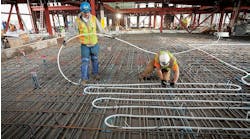Latest from Best Practices
Sponsored
Backflow Prevention: Why Every Plumber Should Get Certified
Plumbing is one of the most profitable subcontracting careers out there. According to Money magazine, it’s the sixth highest-paying job that doesn’t require a degree and provides reliable job security. Backflow prevention training and certification can take these benefits further.
Backflow happens when the flow of water shifts within a piping system, causing non-potable fluids to flow back towards clean water. This can contaminate the water people use for cleaning or drinking, leading to a wide range of problems. It’s a preventable issue, too, but it takes a certified expert to install and test the necessary equipment.
Because preventing backflow is one of the most basic elements of system design and installation, many plumbers may forgo certification, deeming it unnecessary. But this may cause them to miss out on a world of opportunity. Here’s why every plumber should pursue backflow prevention certification.
Backflow Is Common
Plumbers, and contractors as a whole, have the opportunity to become certified in a range of specialties. Many of these can seem like small niches, which may improve business in some areas but could be unnecessary. Backflow prevention is not a niche. Instead, it addresses a surprisingly common issue.
Backflow comes from cross-connections. These are areas where a water supply could contact non-potable liquids, gases, or solids. These cross-connections are everywhere, including garden hoses, which happen to be the most common source of backflow in the U.S. Since these connections are so commonplace, backflow is a prevalent problem across the country.
More than 1,000 backflow incidents can occur in a single state every year. As long as there are cross-connections in water systems, this will be an issue that requires certified professionals. Plumbers can be confident they’ll put their certification to use.
Backflow Poses Health Risks
Another reason all plumbers should pursue backflow prevention certification is that this issue is a potentially dangerous one. When contaminated fluids enter clean water supplies, it can create considerable health problems. The CDC (Centers for Disease Control) recorded 57 waterborne disease outbreaks from backflow across 17 years, leading to more than 9,700 cases of illness.
Even in a nation with as much clean water as the U.S., there are 7.15 million waterborne illnesses a year. While backflow doesn’t account for all of those instances, it is a substantial contributor. Plumbers with the appropriate certification can help fight these diseases.
Certified plumbers can install backflow prevention measures during the construction phase of a building. That way, they prevent these health risks from arising from the start. Otherwise, issues could arise in the future, and another plumber will have to come to fix the situation, hopefully before anyone becomes ill.
Backflow Prevention Can Be Profitable
On a less severe note, plumbers may want to pursue this certification for business reasons. Plumbing is already a potentially profitable profession, earning a median wage of $55,160 a year. Becoming certified in backflow testing and prevention can increase earnings due to a couple of factors.
First, this certification increases the services a plumber can provide, giving them a bargaining chip for a higher wage. Preventing backflow also involves installing new equipment in a pipe system, not just addressing a problem within the pipes themselves. The workers who do this can charge their clients more to account for the extra expenses.
Second, backflow equipment requires regular testing and maintenance to ensure it’s working properly. That means every time a plumber installs these systems, there’s a good chance they’ll get repeat business from that client. These equipment checks provide a steady, consistent source of payment in addition to a plumber’s regular work.
Backflow Prevention Certification Can Attract Customers
Backflow certification may also help plumbers reach more potential clients. Considering how frequent an issue backflow can be, many customers will look for appropriately qualified professionals in their area. If plumbers advertise their certification, these clients will find them faster and provide more work.
Customers may not be aware of the need for certification in this area, but that doesn’t negate its advertising power. A quick Google search of “backflow prevention” or “backflow testing” will pull up certified professionals in the area. Being able to advertise these services helps plumbers appear in these searches and reach new clients.
Backflow certification can stand out even to people who don’t have any related issues. Certifications, in general, demonstrate commitment to the profession and build trust with potential clients. This showcase of a plumber’s knowledge and trustworthiness can help them stand out from any competitors.
How to Get Certified in Backflow Prevention
Plumbers who want to obtain backflow certifications have a few options.
As with many other types of certifications, multiple organizations offer training and licensing, so plumbers can choose whichever seems best to them. Generally speaking, larger organizations will be a better choice, as potential clients may be more likely to recognize their names.
Within each organization, there may be multiple certifications a plumber could pursue. These often differ by their specific field, so contractors should decide which best fits the work they want to perform. What the process looks like from there can vary depending on the organization and specific certification.
Some organizations, like the American Backflow Prevention Association (https://www.abpa.org/page/Tester_Cert), only require a test, not a specific training course. Still, if a plumber hasn’t trained in this area, they won’t likely be able to pass the exam. Other certification programs include classes and hands-on training before testing a plumber’s skills.
With most, if not all, certification boards, a plumber’s credentials will expire eventually. They will then have to re-test to renew their certification to keep advertising and providing these services. This renewal may require retaking the same test, but some organizations, like the Institute of Cross-Connection (https://backflowinstitute.com/training/) provide different re-certification courses and tests.
Every Plumber Should Consider Backflow Certification
Backflow prevention certification can push any plumber’s career forward. It increases the scope of work they can perform, attracts new customers, raises wages, and helps them prevent health hazards. The certification process is also relatively straightforward and short, providing these benefits without a significant investment.
As the nation’s water infrastructure ages, these issues could become increasingly prominent, further raising the need for certified backflow workers. With the right credentials, plumbers can make an already in-demand and profitable business even more successful.
Rose Morrison is a freelance writer who covers construction, home improvement, and contracting topics. She is also the managing editor of Renovated.com, a site dedicated to the latest trends in the home industry. She has a passion for innovative technologies that are making the home industry sustainable and efficient. Check out Renovated.com to see more of her work.

Rose Morrison
Rose Morrison is a freelance writer who covers construction, home improvement, and contracting topics. She is also the managing editor of Renovated.com, a site dedicated to the latest trends in the home industry. She has a passion for innovative technologies that are making the home industry sustainable and efficient. Check out Renovated.com to see more of her work.


